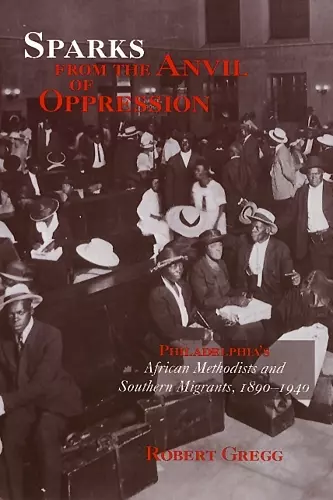Sparks from the Anvil of Oppression
Philadelphia's African Methodists and Southern Migrants, 1890-1940
Format:Paperback
Publisher:Temple University Press,U.S.
Published:14th Aug '98
Currently unavailable, and unfortunately no date known when it will be back

How the African Methodist Churches in Philadelphia coped with the Great Migration
Examines the interconnected developments to reveal a new and less monolithic picture of African American communities. This book cites the work of African American Methodist intellectuals and ministers to illustrate the philosophy of "uplift" preached and practiced in A M E churches.The richness of African American culture during the early years of the century emerges from Robert Gregg's wide-reaching study of African Methodist Churches, southern migrants, and expanding ghettos in Philadelphia. Contending that isolating these powerful forces distorts social history, Gregg examines their interconnected developments to reveal a new and less monolithic picture of African American communities. While some histories have charged black religious institutions with failure to help southern migrants adjust to urban life, "Sparks from the Anvil of Oppression" cites the work of African American Methodist intellectuals and ministers to illustrate the philosophy of "uplift" preached and practiced in A.M.E. churches. The church and many of its established members attempted to create community and respond to the migrants' depressed living and work environments. Class and regional differences, diversity among migrant populations, and the consolidation of the ghetto undermined attempts to create a unified black community, Gregg argues. African Methodist churches became sites of struggle for the status and power that could not be attained outside the black community. Author note: Robert Gregg is Assistant Professor of History at the Richard Stockton College of New Jersey and currently a Fellow at the Shelby Cullom Davis Center for Historical Studies at Princeton University.
"Gregg's work is nicely nuanced, convincingly supported, and attractively presented... His work will undoubtedly be useful to both social and religious historians in advancing their understanding of this pivotal period in American (and African-American) history." - Journal of American History "Building on the tradition of community studies, of E.P. Thompson, Kenneth Kusmer, and Joe William Trotter, Gregg brings an intricacy and sophistication to his analysis that is admirable." - Emma Lapsansky, Haverford College, Pennsylvania Magazine of History and Biography "This is a valuable and insightful study. It challenges very effectively the argument that the established churches didn't help migrants and hence contributed to their 'failure to make good' in the North. The author deserves special praise for his assessment of what the Philadelphia churches actually did do, and the reasons for their failure to attract more of the newcomers. It adds much to our understanding of the nature of the Great Migration." - Julie Winch, History, University of Massachusetts "The hegira of southern blacks during and after World War I is a significant watershed in African American history. Gregg's study helps break new ground by stressing the religious and cultural impact of the exodus, though the weight of his presentation is on how northern religious institutions, specifically the African Methodist churches, responded to the challenge of the arrival of the arrival of the migrants. He has used a wide range of primary sources very effectively. His examination of the records pertaining to Mother Bethel is especially interesting." - Milton Sernett, Department of African American Studies, Syracuse University
ISBN: 9781566396646
Dimensions: unknown
Weight: unknown
272 pages